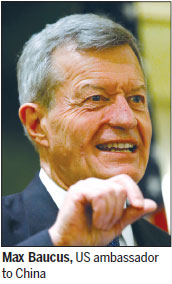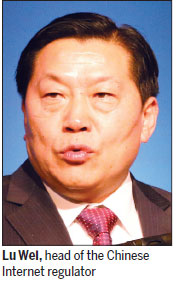China's Internet regulator to 'WeChat' with US ambassador
Lu Wei, head of the Chinese Internet regulator, and the US Ambassador to China Max Baucus are WeChat buddies.
And they will use the most popular instant-messaging tool in China to discuss the thorniest cyber issues the two countries face. It's unclear whether they'll use emojis - animated emoticons - in their chat threads. That might be a first in international diplomacy.
At a Chinese New Year reception held by the Cyberspace Administration Office of China, Lu told Baucus that he would welcome an exchange of views on Internet regulation via WeChat, a social networking tool developed by Tencent Holdings that has more than 400 million users worldwide.
"WeChat will be a very normal channel to exchange ideas for me and Baucus," Lu said.
China is imposing tougher Internet regulatory policies because of fears an unfettered Internet could damage information security and social stability.
"The word 'net' also means law and order in Chinese culture," Lu said. "Every Internet user desires cyberfreedom, and order is the foundation," Lu said. "Where there is no order, there will be no freedom."
China and the United States have had a number of skirmishes over cybersecurity and Internet freedom.
"I heard the message of cooperation from Lu," Baucus said. "I think we should focus more on the cooperation than on the differences."
The former US senator from Montana, who took up his current job last March, agreed that both parties should keep the dialogue channels open and functioning.
The US, the creator of the Internet and a key overseer, is gradually losing control over the biggest innovation after electricity, as a number of countries are asking for an intergovernmental body to oversee the Net.
Fadi Chehade, chief executive of the cyberspace governing body, the Internet Corporation for Assigned Names and Numbers (ICANN), warned on Monday that hopes to transfer control of ICANN from US hands to a globally representative body could be jeopardized unless a deal is reached before the 2016 US presidential elections, Agence France-Presse reported.
Lu's words may indicate that China, with its fast-developing Internet market, is increasingly interested in the international governance of cyber space.
China suspended the bilateral working group on cybersecurity immediately after the US Justice Department indicted five People's Liberation Army officers last May for alleged cyber theft, charges China has denied.
Like many other countries in the world, China has become increasingly wary of cybersecurity following the revelations in the past 20 months made by former National Security Agency contractor Edward Snowden that the NSA has been conducting wide-ranging surveillance of foreign leaders, governments and corporations, including some in China.
Lu, minister of China's State Internet Information Office, paid a high-profile visit to the US in December, attending the seventh China-US Internet Industry Forum in Washington, meeting US officials, speaking to students and faculty at George Washington University, visiting Silicon Valley and interacting with entrepreneurs, including Facebook founder Mark Zuckerberg.
China has become the world's largest Internet market, with more than 4 million websites, 600 million Internet users and four of the world's Top 10 Internet companies. Online commerce is set to hit $2 trillion this year and keep growing at 30 percent a year, Lu told the China-US Internet forum.
Contact the writers at gaoyuan@chinadaily.com.cn and chenweihua@chinadailyusa.com


(China Daily USA 02/10/2015 page1)


















